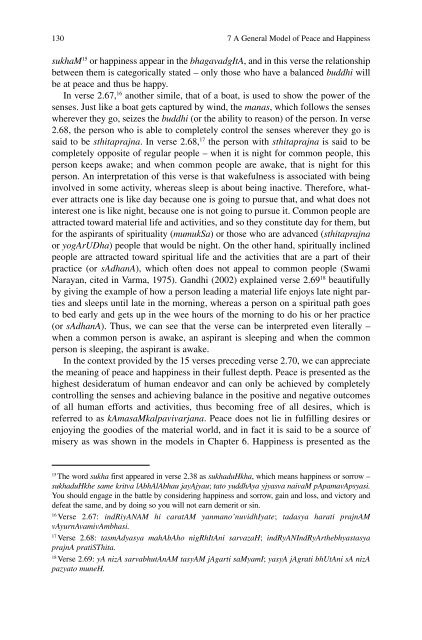Spirituality and Indian Psychology: Lessons from ... - Mandhata Global
Spirituality and Indian Psychology: Lessons from ... - Mandhata Global
Spirituality and Indian Psychology: Lessons from ... - Mandhata Global
You also want an ePaper? Increase the reach of your titles
YUMPU automatically turns print PDFs into web optimized ePapers that Google loves.
130 7 A General Model of Peace <strong>and</strong> Happiness<br />
sukhaM 15 or happiness appear in the bhagavadgItA, <strong>and</strong> in this verse the relationship<br />
between them is categorically stated – only those who have a balanced buddhi will<br />
be at peace <strong>and</strong> thus be happy.<br />
In verse 2.67, 16 another simile, that of a boat, is used to show the power of the<br />
senses. Just like a boat gets captured by wind, the manas, which follows the senses<br />
wherever they go, seizes the buddhi (or the ability to reason) of the person. In verse<br />
2.68, the person who is able to completely control the senses wherever they go is<br />
said to be sthitaprajna. In verse 2.68, 17 the person with sthitaprajna is said to be<br />
completely opposite of regular people – when it is night for common people, this<br />
person keeps awake; <strong>and</strong> when common people are awake, that is night for this<br />
person. An interpretation of this verse is that wakefulness is associated with being<br />
involved in some activity, whereas sleep is about being inactive. Therefore, whatever<br />
attracts one is like day because one is going to pursue that, <strong>and</strong> what does not<br />
interest one is like night, because one is not going to pursue it. Common people are<br />
attracted toward material life <strong>and</strong> activities, <strong>and</strong> so they constitute day for them, but<br />
for the aspirants of spirituality (mumukSa) or those who are advanced (sthitaprajna<br />
or yogArUDha) people that would be night. On the other h<strong>and</strong>, spiritually inclined<br />
people are attracted toward spiritual life <strong>and</strong> the activities that are a part of their<br />
practice (or sAdhanA), which often does not appeal to common people (Swami<br />
Narayan, cited in Varma, 1975). G<strong>and</strong>hi (2002) explained verse 2.69 18 beautifully<br />
by giving the example of how a person leading a material life enjoys late night parties<br />
<strong>and</strong> sleeps until late in the morning, whereas a person on a spiritual path goes<br />
to bed early <strong>and</strong> gets up in the wee hours of the morning to do his or her practice<br />
(or sAdhanA). Thus, we can see that the verse can be interpreted even literally –<br />
when a common person is awake, an aspirant is sleeping <strong>and</strong> when the common<br />
person is sleeping, the aspirant is awake.<br />
In the context provided by the 15 verses preceding verse 2.70, we can appreciate<br />
the meaning of peace <strong>and</strong> happiness in their fullest depth. Peace is presented as the<br />
highest desideratum of human endeavor <strong>and</strong> can only be achieved by completely<br />
controlling the senses <strong>and</strong> achieving balance in the positive <strong>and</strong> negative outcomes<br />
of all human efforts <strong>and</strong> activities, thus becoming free of all desires, which is<br />
referred to as kAmasaMkalpavivarjana. Peace does not lie in fulfilling desires or<br />
enjoying the goodies of the material world, <strong>and</strong> in fact it is said to be a source of<br />
misery as was shown in the models in Chapter 6. Happiness is presented as the<br />
15 The word sukha first appeared in verse 2.38 as sukhaduHkha, which means happiness or sorrow –<br />
sukhaduHkhe same kritva lAbhAlAbhau jayAjyau; tato yuddhAya yjyasva naivaM pApamavApsyasi.<br />
You should engage in the battle by considering happiness <strong>and</strong> sorrow, gain <strong>and</strong> loss, <strong>and</strong> victory <strong>and</strong><br />
defeat the same, <strong>and</strong> by doing so you will not earn demerit or sin.<br />
16 Verse 2.67: indRiyANAM hi caratAM yanmano’nuvidhIyate; tadasya harati prajnAM<br />
vAyurnAvamivAmbhasi.<br />
17 Verse 2.68: tasmAdyasya mahAbAho nigRhItAni sarvazaH; indRyANIndRyArthebhyastasya<br />
prajnA pratiSThita.<br />
18 Verse 2.69: yA nizA sarvabhutAnAM tasyAM jAgarti saMyamI; yasyA jAgrati bhUtAni sA nizA<br />
pazyato muneH.

















